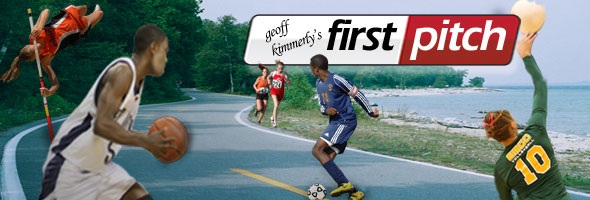
Did you lose this medal?
By
Geoff Kimmerly
MHSAA.com senior editor
August 19, 2013
It’s not quite a needle in a haystack. But it could turn into a great story.
This 1984 MHSAA Regional medal, pictured above, was found recently in Massachusetts with a metal detector. The finder, coincidentally a former collegiate track and field coach, hopes to return the medal to its rightful owner.
 Doing so might not be as difficult as it sounds, but we’ll need help from our friends in the track and field community.
Doing so might not be as difficult as it sounds, but we’ll need help from our friends in the track and field community.
Here’s what we know:
- The medal was received for finishing fourth in the 800 meters at a Class B Regional in 1984.
- The Regional had to be in the Lower Peninsula, because Class A and Class B were and continue to be combined in the Upper Peninsula.
- There were 10 Class B Regionals during the 1984 season, hosted by Sturgis, Parma Jackson County Western, Chelsea, Warren Fitzgerald, Linden, Corunna, Ovid-Elsie, Fremont, Greenville and Gaylord.
- So that means the medal could have only 20 possible owners.
Unfortunately, we do not have Regional results from the 1980s on file in our office. That’s where our helpers come in.
If you have results, or any idea who won this medal, please contact me at [email protected]. If we can connect medal with owner, we’ll tell much more of this story – including that of the coach who found it and made the call to start its return trip home.

NFHS Voice: Reading the Crystal Ball
May 15, 2020
By Karissa Niehoff
NFHS Executive Director
Re-opening is the key word in sports at all levels right now. Every day, there are new projections for when the National Basketball Association and Major League Baseball will resume – and if the National Football League will start on time this fall.
Along with leaders of youth-level sports and the NCAA, the NFHS and its member state associations are exploring all options for conducting sports this fall. And while we all want answers, the truth is that there are more questions than answers at this point.
Dr. Anthony Fauci, the leading national medical authority throughout the COVID-19 pandemic, told ESPN earlier this week that “the virus will make the decision for us” on whether sports will return this fall. His comments underscore the need for leaders of all levels of sport in the United States to exercise great caution as we re-engage in activities.
Without a doubt, education will play a larger role in the decision-making process for high school programs than for non-scholastic programs. Despite the significant loss of revenue that could occur at some levels if programs remained closed, health and safety concerns must take priority when it comes to re-opening the sport or activity.
At the high school level, sports and other activity programs will most likely not return until schools re-open. High school sports and performing arts are education-based programs and complete the learning process on a day-to-day basis. As such, academics during the school day and sports and other activities after school are inseparable.
Could any of those sports and activities return without fans? That option is certainly not one schools favor, but it is a very real possibility. While a few state associations opted for that arrangement to complete state basketball tournaments, that is not a desired ongoing plan for school sports. Besides, this troubling question would have to be addressed: If it is unsafe for fans in the stands, is it safe for the students to be participating?
Students, parents and other fans in the stands cheering for and supporting student-athletes, and applauding from the theatre audience, are among the most wonderful aspects of education-based activities. Before accepting that arrangement, efforts will continue to make attending events a safe experience for everyone.
While we remain uncertain as to the timetable for the return of high school sports and other activities, we believe that when these programs return – and they will return – that everyone will bring renewed zeal to provide the 12 million participants in these programs the best experience possible.
One of the challenges to solving the crystal ball of high school sports and activities this fall is the uncertainty of the spread of the virus as states begin to re-open this month. The NFHS will continue to work with its Sports Medicine Advisory Committee on an ongoing basis to provide the most updated information.
With the non-negotiable tenet of safety for student activity participants, expect every avenue to be pursued so that students can be involved in football, soccer, volleyball, field hockey, speech, debate, music and many other school activities this fall.
Dr. Karissa L. Niehoff is in her second year as executive director of the National Federation of State High School Associations (NFHS) in Indianapolis, Indiana. She is the first female to head the national leadership organization for high school athletics and performing arts activities and the sixth full-time executive director of the NFHS, which celebrated its 100th year of service during the 2018-19 school year. She previously was executive director of the Connecticut Association of Schools-Connecticut Interscholastic Athletic Conference for seven years.

